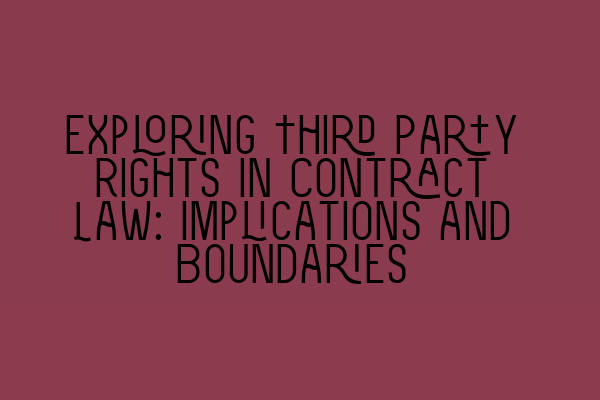Exploring Third Party Rights in Contract Law: Implications and Boundaries
In the vast landscape of contract law, one area that often raises questions and sparks debate is the concept of third-party rights. As a solicitor specializing in contract law, it is essential to understand the implications and boundaries of third-party rights to provide accurate legal advice and foster client trust. This blog post aims to unravel the intricacies surrounding third-party rights in contract law, shedding light on their significance and exploring their various implications.
What are Third Party Rights?
Before delving into the implications, let’s establish a clear definition of third-party rights in the context of contract law. Simply put, third-party rights refer to situations where a contract confers benefits or imposes obligations on someone who is not a party to the contract. In other words, it allows a person who is not directly involved in the contractual agreement to enforce its terms or receive its benefits.
Implications of Third-Party Rights:
1. Intended and Incidental Beneficiaries:
Third-party rights can be categorized into two main types: intended beneficiaries and incidental beneficiaries. Intended beneficiaries are individuals or entities who were deliberately intended to benefit from the contract, even though they are not parties to it. On the other hand, incidental beneficiaries are individuals or entities who unintentionally receive a benefit from the contract, but not due to direct intention.
Understanding the distinction between these two types of beneficiaries is crucial, as it impacts their ability to enforce the contract. Unlike incidental beneficiaries, intended beneficiaries have the legal standing to enforce the contract’s terms and seek remedies for any breach.
2. Privity of Contract:
Privity of contract is another critical principle to consider when examining third-party rights. Privity refers to the relationship that exists between the parties to a contract. Traditionally, only the parties who have privity of contract possess the right to enforce its terms. However, exceptions to this principle have emerged over time, allowing third parties certain rights under specific circumstances.
3. Exceptions and Common Scenarios:
One notable exception to the privity rule occurs when a contract contains an expressly stated intention to confer benefit on a third party. This approach is known as the doctrine of privity exception or the “doctrine of proper construction.” It enables the intended beneficiaries to enforce the contract as if they were party to it.
Additionally, statutory interventions, such as the Contracts (Rights of Third Parties) Act 1999 in the UK, have been enacted to address the limitations of privity. This act gives third parties the ability to enforce rights conferred upon them by a contract, even without being named as parties to it. The Act sets out requirements for a valid third-party claim, ensuring that the rights are clear and identifiable.
Boundaries of Third-Party Rights:
While there are exceptions to the privity rule and statutory provisions protecting third-party rights, there are still boundaries that must be respected. It is crucial for solicitors and contract law professionals to be aware of these limitations to provide accurate legal advice.
1. Exclusion Clauses:
In contract drafting, it is common for parties to include exclusion clauses to limit their liability. These clauses may also extend to third parties, effectively excluding or limiting their ability to claim benefits or enforce the contract. Careful consideration must be given to such clauses and their impact on potential third-party rights.
2. Notice Requirements:
In some cases, contracts may specify requirements for notice to be given to third parties in order for them to enforce their rights. Failure to adhere to these requirements may jeopardize a third party’s ability to enforce the contract or claim any benefits.
3. Privity of Contract Presumption:
Although exceptions to the privity rule exist, it is important to remember that the default position in contract law is still one of privity. Third-party rights should not be assumed unless there is clear evidence of intention to confer such rights within the contract.
Final Thoughts:
Exploring third-party rights in contract law opens up a complex and nuanced area of legal practice. Understanding the implications and boundaries surrounding third-party rights is of utmost importance for solicitors and contract law experts. It ensures accurate legal advice, aiding clients in navigating contractual relationships and safeguarding their interests. While exceptions and statutory provisions offer some level of protection to third-party beneficiaries, it is crucial to proceed with caution and carefully analyze each situation on a case-by-case basis.
If you require legal guidance or have concerns related to third-party rights in contract law, it is advisable to consult a solicitor with expertise in the field. Their knowledge and experience will help you navigate the intricacies of this aspect of contract law, ensuring your interests are protected and upheld.
